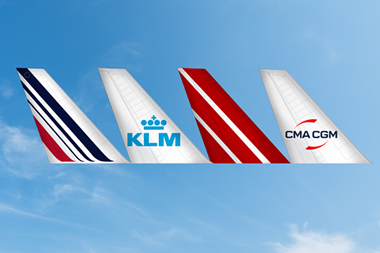The need to meet the increasingly global operations of freight forwarder customers was a key driver behind the recently launched partnership between CMA CGM Air Cargo and Air France KLM Martinair Cargo (AFKLMP).
The tie-up, first announced in May 2022 and with a duration of 10 years, will see the two carriers jointly operate the full-freighter aircraft capacity of their respective airlines, initially including CMA CGM’s six freighter aircraft and AFKLMP’s six freighters.
The commercial partnership also covers Air France-KLM’s belly aircraft capacity, including more than 160 long-haul aircraft.
The two have also aligned systems, network strategies, revenue management, distribution and approach to customers – online they both utilise the same myCargo platform developed by the Franco-Dutch airline group.
When asked about the key benefit of the partnership, both airlines highlighted the expanded networks they are able to offer and explained this will meet the need to offer global solutions.
Guillaume Lathelize, chief executive of CMA CGM Air Cargo, said: “Being a young airline, partnering with an established airline, having access to a global network of services, makes our product offer more relevant.
“We are part of a large shipping container group [CMA CGM] which also has a large logistics group under the CEVA brand. Our aim is also to become a relevant brand in the aviation cargo industry.
“We found that partnering with AF KLM would accelerate the learning curve towards becoming a global player. The joint product we offer today is for our group’s customers much more relevant compared with what we could do alone.”
AFKLMP executive vice president cargo Adriaan Den Heijer added: “We believe that to be the player we would like to be from our two hubs [Paris CDG and Schiphol] it is important that we can offer a global network.
“For CMA CGM Air Cargo it is a way to accelerate their business model and for us, we now have full freighter capacity into China and India in addition to what we already have into Africa, South America and the US. It complements our belly setup, making us more relevant to our customers.”
Den Heijer added that ongoing consolidation in the freight forwarding market meant that customers were becoming increasingly global, and airlines needed to mirror this trend with the services they can offer.
"There are customers that are looking for partners that can offer solutions for all their supply chain challenges," added Lathelize. "And we as a group are now in a position to meet these challenges and provide solutions combining our ocean and air assets in partnership with AF KLM."
Den Heijer also said that CMA CGM’s investment in a 9% stake in the Air France KLM Group demonstrated the new entrant’s commitment to the partnership.
The two also pointed to the potential to develop sea-air or air-sea operations through CMA CGM’s presence in the container shipping market.
One potential area of controversy is the CMA CGM Group’s ownership of freight forwarder CEVA Logistics, which is set to become a top-five buyer of airfreight capacity after the group reached a deal to purchase Bolloré Logistics.
The two insisted that CEVA would be treated the same as any other freight forwarder.
“We take care that we have, governance-wise and organisational-wise, very good boundaries. The cooperation we have with CMA CGM is an air cargo cooperation. Period,” said Den Heijer.
“The moment that is happening [CEVA gaining an advantage] we are out of the game.”
He added: “There are legal thresholds but also ethical and business thresholds that will take care of that. And most customers recognise that. But of course, we have questions about that, and that is logical.”
Lathelize pointed out that the CMA CGM Group had been operating its CEVA business and container shipping business separately for the last five years and there was no question of co-operation between the two.
“In the shipping industry, it is recognised that CEVA is operated at arm’s length with our shipping business.
“It is a little bit newer in the air cargo industry because we were not an air cargo player before, but we have put in place all the necessary boundaries to make sure our freight forwarding customers are comfortable working with us.”
Both also said there were an increasing number of hybrid structures in the wider logistics-supply chain market - partnerships between airlines and forwarders, shipping groups owning forwarding operations and airlines - and therefore the industry was growing used to this type of setup.















